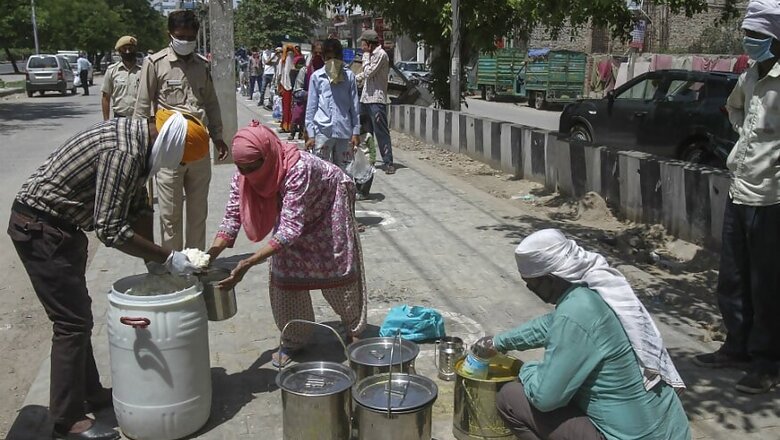
views
India could have 200 million people infected with Covid-19 by September, as suggested in a recent interview by Dr Laxminarayan, Director of the Center for Disease Dynamics, Economics & Policy. The number of cases could surge in rural India, with millions of migrants having returned to their homes in West Bengal, Bihar, Odisha, Jharkhand and Chhattisgarh.
With different experts weighing in with several opinions on coronavirus, one thing is for certain -- for now we have to live with the virus. We have to mitigate its impact on our society, especially those who are already vulnerable, which includes pregnant and lactating women and young children.
Based on prior experience, we know that resilience of an individual and a community is a key resource in fighting a pandemic. Nutritional status is a key indicator of resilience as inadequate nutrition leads to a depressed immune system making an individual susceptible to infections. As Covid-19 poses a set of challenges with impacted food systems, agriculture, economy, public health systems. It is a necessity that we build resilience through the right nutrition and care, especially among those that are vulnerable with limited access to basic services.
A few months back in the pre-Covid days, we were travelling through a tribal village in Odisha. We met Rani, a 16-month old, born healthy but did not gain weight and grow as months passed. Despite counseling by the Anganwadi worker (AWW) and providing additional take-home rations in line with the ICDS, Rani’s condition deteriorated. She did not show any improvement on the growth charts and slipped into the red zone. Quick action by the AWW and the community led to Rani’s admission into a nutrition rehabilitation centre. After 14 days of treatment, Rani had gained weight and was no longer malnourished and through continued community monitoring she is a happy and healthy child.
This story is important as during the pandemic and through the lockdown, there were and still are many like Rani all across India in urgent need of nutrition and childcare. It is a huge possibility with all energies diverted to the pandemic, the need of children and their mothers is ignored.
There is a grave chance that we stand to lose the gains we have made as a country over a decade on nutrition. In the last 10 years, the mortality rate for children under 5 has improved by 48% and stunting in children under 5 has improved by over 9 percentage points. This indicates improvement in maternal nutrition, childcare practices, overall behavior change towards good nutrition practices and improved access to essential services.
Yet there are gaps and areas of improvement, which was flagged by the Global Nutrition Report 2020. The report indicated that India will not achieve the 2025 global nutrition targets, one reason being the high levels of nutrition inequity within the country. This is evident from the latest round of National Health & Family Survey (4) where there are disparities between the urban and rural nutrition indicators. For example, the mortality in children under 5 in rural India is higher than urban India (56 deaths per 1,000 live births in rural areas compared to 34 deaths per 1,000 live births in urban areas) and likewise stunting in children is 10 percentage points higher in rural India.
But most worrying in our nutrition story is wasting among India’s children. Prior to the pandemic, India’s wasting levels among its under fives had only increased over the decade, showing no progress with one of the highest wasted children in the world. The Covid-19 pandemic has caused disruptions in accessing health services and adequate diets for mothers and children having a direct impact on the number of children wasted. An increase in wasting among children could result in increased number of child deaths.
A recent paper published in the Lancet Global Health 2020, indicates thought provoking and worrisome estimates of under-5 child mortality due to the inaccessibility caused by the pandemic. A reduction anywhere between 39% and 51% in coverage of services related to family planning, antenatal care, child vaccinations, postnatal care and childcare, could increase wasting levels by 50% resulting in an additional 1 million child deaths over 6 months in low- and middle-income countries.
Despite efforts in different States, there has been an interruption to essential services for maternal and child nutrition, with frontline workers involved in Covid duty. There is a real threat to our children and women in the reproductive age, more so if they belong to poorer households. India needs to bring back the focus on improving nutrition especially fighting wasting and its determinants.
The pandemic should be used as an opportunity to build resilience and intervene in a focused manner, identifying individuals and households that are vulnerable to malnutrition. The government needs to provide the much-needed fiscal impetus to strengthen health and nutrition services and ensure their continued delivery. Leverage the network of frontline workers and the Panchayati Raj Institutions (PRIs) to do this. This requires decentralization of both power and funds, to empower the PRIs to plan and implement the best, locally relevant interventions. Further create a support system at the community level that wields accountability and ensures that there is availability and access to nutritious food and essential services to all in the community.
Finally, the pandemic has been a dark time for children from poor households, it is an apt time to ask ourselves and policy makers: Who really is accountable for the Ranis of India?
(The writers work at IPE Global on improving nutrition for vulnerable communities. Views expressed are personal.)
















Comments
0 comment